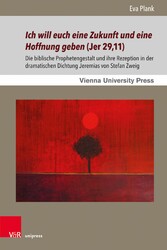Ich will euch eine Zukunft und eine Hoffnung geben (Jer 29,11) - Die biblische Prophetengestalt und ihre Rezeption in der dramatischen Dichtung Jeremias von Stefan Zweig
von: Eva Plank
Vandenhoeck & Ruprecht Unipress, 2018
ISBN: 9783847009030
, 479 Seiten
Format: PDF
Kopierschutz: Wasserzeichen
Preis: 70,00 EUR
eBook anfordern 
Mehr zum Inhalt

Ich will euch eine Zukunft und eine Hoffnung geben (Jer 29,11) - Die biblische Prophetengestalt und ihre Rezeption in der dramatischen Dichtung Jeremias von Stefan Zweig
Stefan Zweig bietet mit seinem Drama Jeremias eine neue Interpretation des biblischen Propheten und aktualisiert die Wegführung des Volkes ins Exil mit Blick auf seine Erfahrung der Diasporasituation. Die Autorin erschließt aus theologischer Perspektive, wie das Wirken des Propheten Jeremia und die politischen Ereignisse, die zur Zerstörung Jerusalems und zur Verbannung der Bevölkerung führten, von Stefan Zweig im Drama Jeremias rezipiert und für seine Zeit aktualisiert wurden. Mit dem Drama drückt Zweig im Ersten Weltkrieg mit der Person des Propheten metaphorisch seine Überzeugung von der moralischen Überlegenheit des Unterlegenen aus, die ihre Wurzeln in der jüdischen Tradition hat, und bringt seine pazifistische, weltbürgerliche Haltung in symbolischer Form zur Sprache. The thesis develops how, from a theological perspective, the work of the biblical prophet and the political events, which led to the destruction of Jerusalem and the temple and to the people's being taken into exile, were perceived by Stefan Zweig in his drama Jeremiah. With his drama, Zweig during World War I symbolically expresses his conviction of the moral superiority of the defeated - a conviction which has its roots in the Jewish tradition. The first part of the thesis takes a closer look at the Jewish author Zweig, the second focuses on the drama and discusses it within the broader biblical context. The main part of the thesis is the interpretation of Zweig's drama based on his depiction of the biblical prophet, which partly contributes to a new interpretation of the Book of Jeremiah.
Dr. Eva Plank studierte Fachtheologie an der Katholischen Privat-Universität Linz und ist Professorin für Deutsch, Geographie und Wirtschaftskunde an einer Neuen Mittelschule.










